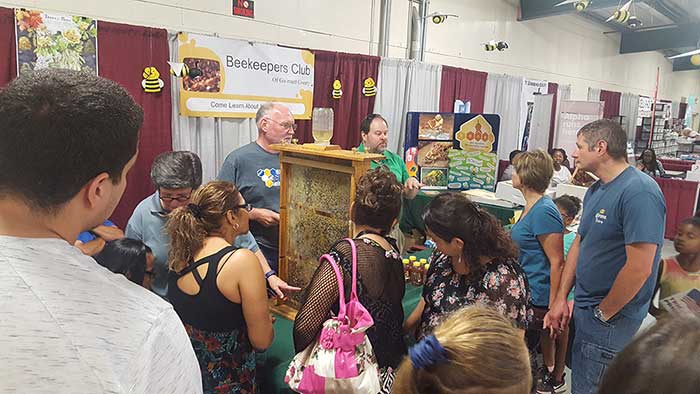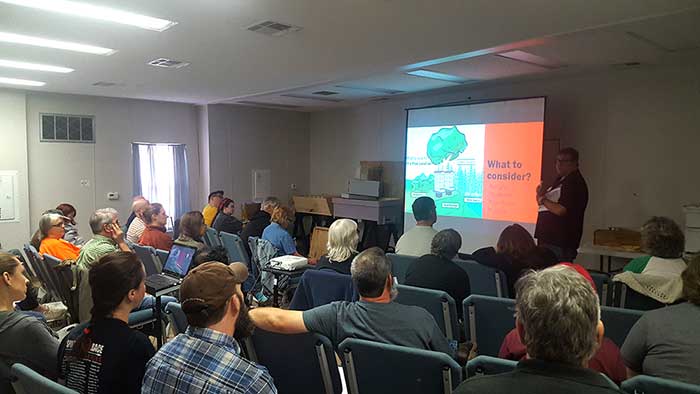They are so valuable because not only are they responsible for the pollination of almost every fruit, nut and vegetable crop, but they pollinate one out of every three bites of food we eat.
Those statistics come from the Beekeepers Club of Gwinnett County, a non-profit organization dedicated to “promoting the interests of beekeeping by serving its members and the community through education, knowledge and resource sharing,” according to the club’s mission statement.
“Clubs such as ours are getting the word out about the importance of honeybees and pollinators,” said Dave Collins, one of the first members of the club and past president. “Beekeepers raise bees to produce honey, as well as pollinate plants.”
Most beekeepers in Georgia are “backyard” (typically less than 20 hives) or “sideline” (20-50 hives). There are only 75-80 “commercial” beekeepers in the state, Collins said. He and his wife, Cindy, are in the “backyard” category with four hives in their apiary. The couple began their hobby 14 years ago as a result of hearing about colony collapse disorder (CCD), a term coined in 2005-06 to describe a condition where the majority of the bees abandon their hive and only leave the queen with a few workers and the brood.

There were insufficient quantities of bees to sustain the hive, so over time the hive would die off. During this time, there was a larger than normal die-off of hives. After many years of research, the cause of CCD was never determined.
“We also were concerned that our large garden did not have any honeybees to pollinate our plants,” he said. “What started out as a small hobby has now grown to a collection of more than 500 pounds of honey per year which we sell via word of mouth.”
The club was founded in 2009 by Tommy Bailey and Rob Alexander with the support of Collins. “Our membership varies throughout the year with spring being the peak at around 75,” Collins said. “We have members from Gwinnett, Jackson, Barrow, Walton and Forsyth counties.”
The group meets the second Tuesday of the month at the Hebron Baptist Church in Dacula at 7 p.m. with guest speakers who have expertise in beekeeping or related topics.

Speakers come from the University of Georgia, Georgia Tech, Clemson University, along with local experts in horticulture, beekeeping-related crafts, bee yard safety, and commercial beekeepers.
Collins said the biggest threat to their bees is “winter die-off.” “We typically lose 25 to 30 percent of our bees each year,” he said. “The massive die-offs started in 2005 and has heightened awareness for us. Since the introduction of the Varroa parasite during this period, it has been more difficult for bees.”
The future of beekeeping in Georgia, according to Collins, is dependent on how successfully beekeepers can keep their bees from dying out.
“Many new beekeepers quit after a few years of losing their hives. Buying new bees each year is not a good motivation to stay in beekeeping,” said Collins, who said last year he lost seven of eight hives due to pesticide poisoning and had to purchase replacement bees.
“The number of dead hives corresponds to the application of mosquito control in our area…” he said.
Public awareness of mosquito spraying needs to continue, Collins explained. “Pollinators are killed along with the mosquitoes and this makes an impact on our honeybee population along with other pollinators,” he said. “Also, the lush green manicured, weed-free lawns are a desert for pollinators. There are no plants in many lawns that the bees can visit and if they do, they may carry pesticides back to the hive, causing a die-off of many bees or even the hive.”
Every spring the honeybee population is replaced by catching swarms, buying bees or by splitting hives. “We take frames from the original hive, along with the original queen to make a new hive, letting the remaining bees raise a new queen from the brood we leave behind,” Collins added.
Other club activities include: a booth at the Gwinnett County Fair in Lawrenceville, the Bee School in March to help train new beekeepers, doing public speaking engagements for schools, libraries, the Gwinnett Environmental and Heritage Center, the Gwinnett County Planning and Zoning Board, and other groups.
The group is part of the Georgia Beekeeping Association (GBA): www.gabeekeeping.com, one of about 50 clubs in Georgia. This year, the GBA worked with the Georgia Department of Transportation (DOT) to launch a “Save the Honeybee” automobile specialty license plate, which is available for purchase with a portion of the money coming back to the Association and the state clubs to promote education about bees.
Information about club meetings and general bee topics is available on the group’s Facebook page under “Beekeepers Club of Gwinnett County.”
Facts about bees you might not know:
There is only one queen per hive. During spring and summer, she can lay up to 2,000 eggs per day, live three years, but is replaced when she does not have an acceptable laying pattern. The hive can produce a new queen by feeding an egg with royal jelly.
There are only about 200 drones (males) in the hive. Their sole purpose: mating with the queen and then dying.
The worker bees have a peak population of about 50,000 in a good hive during late spring and early summer. They live about 30-40 days during that period.
Bees have five eyes. Two are easily visible on the front of their head while three are on top of their head and primarily are used for navigation.
There are about 4,000 species of native bees in North America.

